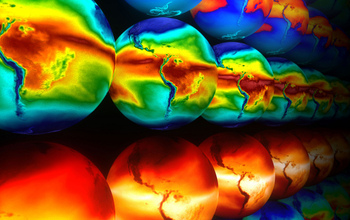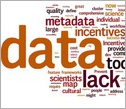News Release 13-181
EarthCube: NSF funds $14.5 million in grants to improve geosciences cyberinfrastructure
Awards foster better data accessibility on research topics, from the sun to the center of the Earth

NSF'S EarthCube awards bring together the geosciences and related fields.
October 28, 2013
This material is available primarily for archival purposes. Telephone numbers or other contact information may be out of date; please see current contact information at media contacts.
Imagine a world with unlimited access to scientific data in any field, where researchers can plot data from any source and visualize it any way they'd like, and where they can model results and explore ideas from a desktop, a lab or the field.
EarthCube aims to make that vision a reality.
EarthCube is a National Science Foundation (NSF) effort to create a data and knowledge management system for geosciences in the 21st century.
Its objective is to develop new ways of understanding and predicting the Earth system, from the sun to the center of the Earth.
To foster a dialog among geo-, bio- and cyberscientists to create an EarthCube framework, NSF has made 13 new awards totalling $14.5 million.
The effort is sponsored by NSF's Directorate for Geosciences along with its Directorate for Computer and Information Science and Engineering.
"Pushing the frontiers of the geosciences requires innovative ways to connect and share data and information," says Roger Wakimoto, NSF assistant director for Geosciences.
"As the internet revolutionized the way we lead our daily lives, scientists are searching for technologies that will advance the ability to discover, collaborate and conduct research at all levels.
"Through EarthCube, NSF has made investments in these technologies and the infrastructure that will be the foundation of addressing challenges in studying the Earth system."
Scientists who specialize in governance; data discovery, mining and access; workflows and other fields are participating.
We're in an era when access to information and data is often less a problem than the ability to efficiently process and use it, geoscientists say.
In some cases, the problem is caused by huge datasets that are difficult to store, transfer or analyze.
In other cases, the challenge is discovering and aggregating relevant data widely disseminated in many locations and formats, such as in the tables, text and figures of published papers, government agency reports, spreadsheets and websites.
A central EarthCube goal is establishing a computing system that can aid in finding, extracting and aggregating data, as well as in processing, summarizing and synthesizing those data in ways that help geoscientists better understand and model Earth systems.
2013 NSF EarthCube Awards:
Yolanda Gil, University of Southern California: EarthCube building blocks: Software stewardship for the geosciences
Kerstin Lehnert, Columbia University, Lamont Doherty Earth Observatory: EarthCube RCN: CP4: Collaboration and cyberinfrastructure for paleogeosciences
Matty Mookerjee, Sonoma State University: EC3: Earth-centered communication for cyberinfrastructure: Challenges of field data collection, management, and integration
Wonsuck Kim, University of Texas at Austin: RCN: Building a Sediment Experimentalist Network (SEN)
Tim Ahern, Integrated Research Institutions for Seismology: EarthCube building blocks: Deploying web services across multiple geoscience domains
Christopher Re, Stanford University: EarthCube building blocks: A cognitive computer infrastructure for geoscience
David Maidment, University of Texas at Austin: EarthCube building blocks: Integrating discrete and continuous data
Siri-Johda Khalsa, University of Colorado: EarthCube building blocks: A broker framework for next generation geoscience (BCube)
Scott Peckham, University of Colorado: EarthCube building blocks: Earth system bridge: Spanning scientific communities with interoperable modeling frameworks
Ilya Zaslasky, University of California, San Diego: EarthCube building blocks: Community inventory of EarthCube Resources for Geoscience Interoperability (CINERGI)
David Fulkner, Open Source Project for Network Data Access Protocols: EarthCube building blocks: Specifying and implementing ODSIP, A data-service invocation protocol
Thomas Narock, University of Maryland, Baltimore County: EAGER: Collaborative research: EarthCube building blocks, leveraging semantics and linked data for geoscience data sharing and discovery
Lee Allison, University of Arizona: EarthCube test enterprise Governance: An agile approach
-NSF-
-
EarthCube awards: NSF's directorates for geosciences; computer & information science & engineering.
Credit and Larger Version -
EarthCube brings together geosciences, bioscientists and cyberscientists, engineers and educators.
Credit and Larger Version -
Imagine a world with easy access to unlimited scientific data: the goal of EarthCube.
Credit and Larger Version -
EarthCube: fostering connectivity among scientific disciplines in the geosciences and beyond.
Credit and Larger Version -
The new EarthCube awards are melding geosciences and cyberinfrastructure.
Credit and Larger Version
Media Contacts
Cheryl Dybas, NSF, (703) 292-7734, email: cdybas@nsf.gov
Related Websites
NSF EarthCube Program: http://www.nsf.gov/geo/earthcube/index.jsp
EarthCube: Data and Knowledge Environment for the Geosciences: http://earthcube.ning.com/
The U.S. National Science Foundation propels the nation forward by advancing fundamental research in all fields of science and engineering. NSF supports research and people by providing facilities, instruments and funding to support their ingenuity and sustain the U.S. as a global leader in research and innovation. With a fiscal year 2023 budget of $9.5 billion, NSF funds reach all 50 states through grants to nearly 2,000 colleges, universities and institutions. Each year, NSF receives more than 40,000 competitive proposals and makes about 11,000 new awards. Those awards include support for cooperative research with industry, Arctic and Antarctic research and operations, and U.S. participation in international scientific efforts.
Connect with us online
NSF website: nsf.gov
NSF News: nsf.gov/news
For News Media: nsf.gov/news/newsroom
Statistics: nsf.gov/statistics/
Awards database: nsf.gov/awardsearch/
Follow us on social
Twitter: twitter.com/NSF
Facebook: facebook.com/US.NSF
Instagram: instagram.com/nsfgov





